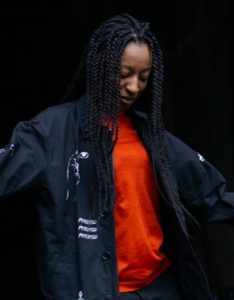A six-year journey that multi-hyphenate Che Kothari set out on is about to come to fruition.

WondaGurl. Photo: Cameron Corrado
About 16 years ago, he started out as a photographer, who then migrated into video production, music production, and launching Gifted Management, then founding Toronto’s annual Manifesto festival, ultimately turning to life coaching and philanthropy. As an advocate, one of his most important achievements was co-founding the BeautifulCity.ca movement, which raises around $18 million per year for public youth arts initiatives in marginalized communities, by putting a fee on the billboards in Toronto. Kothari has lately focused his abundant organizing skills on an urgent environmental emergency: soil extinction.
Kothari is currently putting together a series of projects that will raise awareness for the cause. First up will be several songs – including one written and helmed by Canadian hit-making songwriter/producer WondaGurl (Mariah Carey, Jay-Z, Drake, Ye) – to be released internationally. According to the United Nations, more than one-third of the world’s top layer of earth is endangered, Kothari explains. “To call soil ‘soil,’ it has to have 3 percent organic content, otherwise you’re growing your food in sand,” he says. “If you remove organic content from soil, it becomes dead. Forty percent of climate change could be mitigated it we have healthy soil.”
The seeds for the project were planted six years ago, when Kothari was working as a manager for the soca star Machel Montano. After what seemed like 40 years of constant touring and recording, Montano was trying to slow down his pace. Kothari turned to yoga and meditation as essential elements of the effort, and introduced Montano to the teachings of Jagadish “Jaggi” Vasudev, aka Sadhguru, the Indian yoga guru and proponent of spirituality. Yogic practices and daily meditation gave Montano the relief he so desperately desired.
After meeting Sadhguru personally, Kothari (and Montano) became devotees. Kothari then launched the Conscious Music Circle (CMC): an effort to give those tools of “inner technology” to the arts community, offering them online, in private settings, and also at Sadhguru’s ashrams in India (where 6,000 people live) and in Tennessee. Collaterally, members of the Circle became enthusiastic proponents of the guru’s main cause, the prevention of soil degradation. On the phone from Los Angeles, where he was working with WondaGurl to record the first of three proposed tracks to shed light on their efforts. It’s March 22, the day after Sadhguru set off on a 100-day motorcycle excursion from the U.K. to India, to raise soil extinction awareness.
The track, as yet unnamed, will feature Dhee (an Sri Lankan-Australian songstress whose current hit, “Enjoy Enjaami,” has 405 million views on YouTube), which will ensure international attention. It was written in Malibu, where 25 members of the CMC (artists, producers, songwriters) gathered and listened to Sadhguru as he spoke to them about the soil issue. Afterwards, Kothari claims, “for five days, in three studios, morning to night,” they worked on it. Dhee’s contribution will have an Indian flavour, but other elements will include Afrobeat and Reggaeton artists to add to the inclusive appeal. At press time the final lineup was still being finalized, but they plan to release the track when Sadhguru is “around half-way, day 50-ish,” of his journey. “We’re not putting out a song that’s, ‘Save soil! Save soil!’ it’s a contemporary song that you’ll hear played on the radio,” Kothari says, “that touches on these themes but doesn’t specifically name them.”
That song will be followed by two more, a reggae track and another, written by WondaGurl, that Kothari describes as “Beatles-ish.”
And while all this is going on, Kothari is still deeply involved in this year’s upcoming Manifesto Festival, which he says, “is all about empowering young people through arts and culture in physical and digital spaces,” and its year-long side projects, the Discovery series and FSTVL SZN. The former is an incubation program supporting new young talent, while the vowel-free latter is, “for behind-the-scenes actors – everything from production to graphic design to fashion.” Both programs “graduate” at the festival, scheduled for Aug. 12, 2022.
The ultimate purpose for releasing the soil extinction track isn’t to raise money, but to raise awareness, says Kothari. “Ultimately, I see the role of the artist as being storytellers,” he says. “How do we get these artists to tell these stories that are most pressing? How do we get them involved in advocacy? To me, music is about celebration, but also about moving people towards higher consciousness.
“Sadhguru says it best: ‘I’m not interested in seven billion dollars; I’m interested in seven billion people.’”